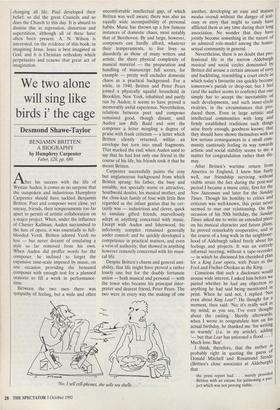We two alone will sing like birds i' the cage
Desmond Shawe-Taylor
BENJAMIN BRITTEN:
A BIOGRAPHY by Humphrey Carpenter Faber, f20, pp. 680 Ater his success with the life of Wystan Auden, it comes as no surprise that the outspoken and industrious Humphrey Carpenter should have tackled Benjamin Britten. Poet and composer were close, yet uneasy, friends, their temperaments too far apart to permit of artistic collaboration on a major project. When, under the influence of Chester Kallman, Auden succumbed to the lure of opera, it was essentially to full- blooded Verdi. Britten adored Verdi no less — but never dreamt of emulating a style so far removed from his own. When Auden did proffer words for the composer, he inclined to forget the expansive time-scale imposed by music, on one occasion providing the bemused composer with enough text for a planned oratorio to fill a week in performance- time.
Between the two men there was sympathy of feeling, but a wide and often
uncomfortable intellectual gap, of which Britten was well aware; there was also an equally wide incompatibility of personal habits. Music has thrown up a few famous instances of domestic chaos, most notably that of Beethoven. By and large, however, composers can hardly afford, whatever their temperaments, to live lives so disorderly as those of many writers and artists; the sheer physical complexity of musical material — the preparation and handling of manuscript full scores, for example — pretty well excludes domestic chaos as a practical background. For a while, in 1940, Britten and Peter Pears joined a physically squalid household in Brooklyn, New York, inhabited and partly run by Auden; it seems to have proved a memorably awful experience. Nevertheless, relations between poet and composer remained good, though distant, until Auden saw Billy Budd and sent the composer a letter mingling a degree of praise with frank criticism — a letter which Britten silently returned, within an envelope but torn into small fragments. That marked the end; when Auden used to say that he had lost only one friend in the course of his life, his friends took it that he meant Britten.
Carpenter successfully paints the cosy but unglamorous background from which Britten sprang: his father, the busy and amiable, not specially warm or attractive, Southwold dentist, his musical mother, and the close-knit family of four with little Ben regarded as the infant genius that he cer- tainly was — industrious and clever, quick to emulate gifted friends, marvellously adept at anything concerned with music. Except with Auden and Isherwood, his inferiority complex remained generally under control; and he quickly developed a competence in practical matters, and even a vein of authority, that showed in anything however remotely concerned with his musi- cal life.
Despite Britten's charm and general ami- ability, that life might have proved a rather lonely one but for the doubly fortunate union — both musical and personal — with the tenor who became his principal inter- preter and dearest friend, Peter Pears. The two were in every way the making of one
`No, I sell cell-phones, she sells sea shells. . . ' another, developing an easy and 'nature modus vivendi without the danger of jeal- ousy or envy that might so easily have afflicted them at any time during their long association. No wonder that they have jointly become something in the nature of an admired role-model among the homo- sexual community in general.
Nevertheless, there is no doubt that pro- fessional life in the narrow Aldeburgh musical and social circles dominated by Britten did arouse a certain amount of envy and backbiting, resembling a court circle in which today's favourite can quickly become tomorrow's pariah or drop-out; but I feel (and the author seems to confirm) that one simply has to accept the inevitability of such developments, and such inner-circle rivalries, in the circumstances that pro- duced them. Even in large artistic and intellectual communities with long and firmly established traditions such things arise freely enough, goodness knows; that they should have shown themselves with so few serious consequences in a small com- munity cautiously feeling its way towards artistic and social stability seems to me a matter for congratulation rather than dis- may.
After Britten's wartime return from America to England, I knew him fairly well, our friendship surviving without visible strain the fact during the post-war period I became a music critic, first for the New Statesman and later for the Sunday Times. Though his hostility to critics and criticism was well-known, this point never seemed to mar our relationship. On the occasion of his 50th birthday, the Sunday Times asked me to write an extended piece on his musical character and future plans; he proved remarkably cooperative, and in the course of a long walk in the neighbour- hood of Aldeburgh talked freely about his feelings and projects. It was an entirely informal meeting, without a tape-recorder in which he discussed his cherished plan for a King Lear opera, with Pears as the Fool and Fischer-Dieskau as the King. Conscious that such a disclosure would arouse wide interest, I asked him before we parted whether he had any objection to anything he had said being mentioned in print. When he said not, I replied 'Not even about King Lear?' He thought for a moment, then said: 'No; it's really well in my mind; as you see, I've even thought about the casting.' Shortly afterwards, when I wrote to congratulate him on his actual birthday, he thanked me 'for writing so warmly' (i.e. in my article), adding but that Lear has unloosed a flood . • Much love. Ben'.
I think, therefore, that the author is probably right in quoting the guess of Donald Mitchell and Rosamund Strode (Britten's close associates at Aldeburgh) that
the press report had . . . merely provided Britten with an excuse for jettisoning a pro- ject which was not proving viable.


















































 Previous page
Previous page